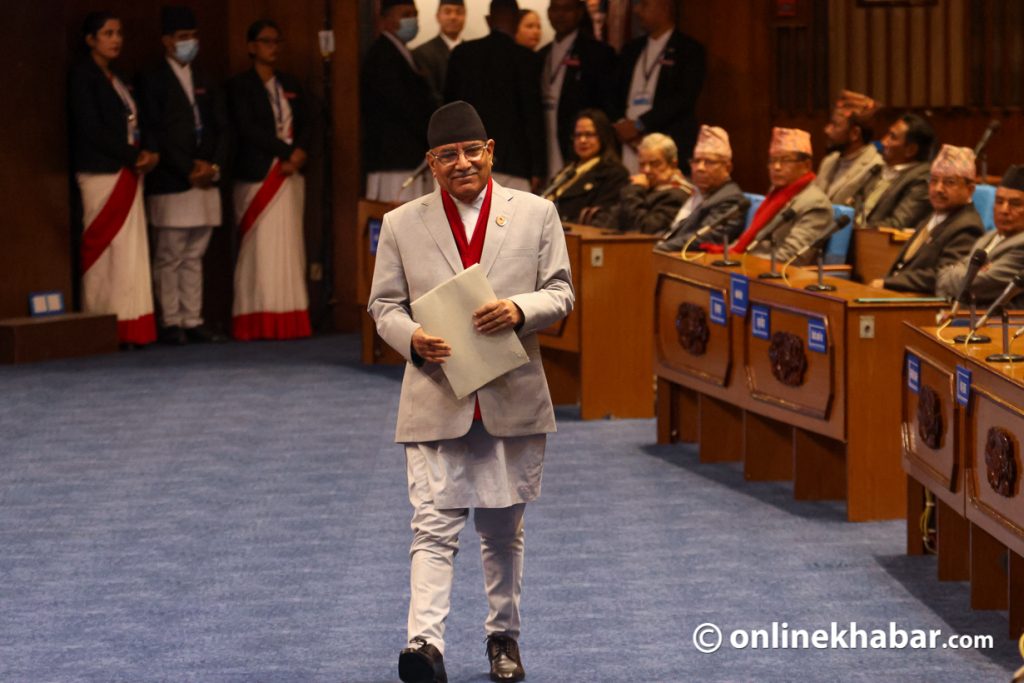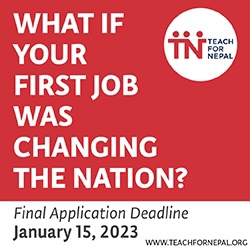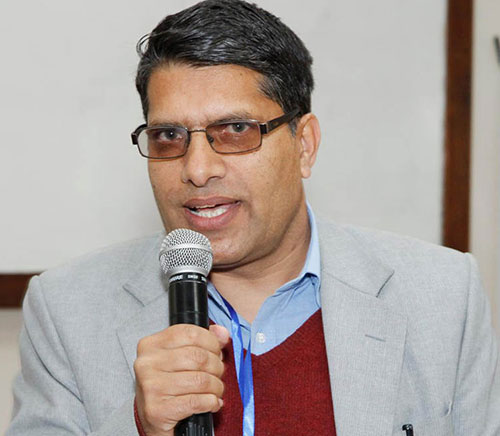२० पुस २०७८ मा सम्पन्न पार्टीको आठौं महाधिवेशन सम्पन्न गरेको झण्डै डेढ वर्षको अन्तरालमा आयोजना गरेको केन्द्रीय समितिको चौथो पूर्ण बैठक हो यो । चौथो भनिए पनि केन्द्रीय समितिको हैसियतको बैठक महाधिवेशनपछिको पहिलो हो । त्यही महाधिवेशन सम्पन्न गरेको हलमा करिब-करिअघि महाधिवेशनमा विभिन्न समूह विभाजन गरिएको थियो र टोली नेताले प्रतिवेदन पेश गरेका थिए, तर यो केन्द्रीय समितिको बैठक भएकोले सबै केन्द्रीय समिति सदस्यले बोल्न सके । अध्यक्ष बाहेक सबैलाई समान पाँच मिनेटको समय निर्धारण गरी बोल्न चाहनेहरूका लागि नाम आहृवान गरियो । थुप्रैले नाम दिए पनि २१८ जनाले बोलिसकेपछि बैठकमा बोल्ने क्रम सकियो ।
अर्को दिन अध्यक्षको जवाफसँगै बैठक सकियो । यो बैठकको अन्तर्यमा माओवादी सच्चिने कि सक्किने भन्ने नै मूल प्रस्थानविन्दु थियो ।
‘२१औं शताब्दीमा समाजवादको नेपाली बाटो’ शीर्षकको दस्तावेज महाधिवेशनमा पारित भएको थियो । सोही महाधिवेशनको निरन्तरताका रूपमा यो बैठक रहृयो । बैठकमा अध्यक्षले सम्पादन नगरिएको दस्तावेज वाचन गरे । ‘दस्तावेजको मूल स्पिरिट ठीक छ तर कार्यान्वयनमा आशंका छ’ भन्ने आशय सहित हरेक वक्ताले आफ्नो मत राखे ।
म्ाहाधिवेशनको दस्तावेजले भन्छः ‘जनताले आज हाम्रो पार्टी र अन्य पार्टीमा खासै भिन्नता देखिरहेको छैन । कमिशन, भ्रष्टाचार, यौन अनैतिकता, व्यक्तिवाद, पद र पैसाप्रतिको आसक्ति बढ्दो छ । यसलाई बदल्न नसक्ने हो भने क्रान्तिकारी पार्टी र उन्नत संस्कृति सहित समाजवादको यात्रामा अगाडि बढ्न सम्भव छैन ।’
महाधिवेशनले किटान गरेको उपरोक्त अवस्थामा खासै परिवर्तन आएको छैन । बरु यो बीचमा महाधिवेशनले लिएका निर्णयहरूको कार्यान्वयनमा झन् बढी बेवास्ता र लापरबाही देखा परे । यसले पार्टीको अवस्थामा सुधार हैन, समस्या झन् बढी गहिरिए । महाधिवेशनपश्चात् पार्टीभित्र अराजकता र चरम गुटबन्दी अर्को समस्या थपियो ।
महाधिवेशनले पदाधिकारी चुन्न सकेन । केन्द्रीय समिति चुनेर महाधिवेशन अन्त्य गरियो । महाधिवेशन अन्त्य गर्दा एक वर्षभित्रै विशेष महाधिवेशन गरेर विचार र संगठनलाई अर्को उचाइमा उठाउने बाचा गरिएको थियो । तर एक वर्ष हैन डेढ वर्षमा न अधिवेशन, न महाधिवेशन न विशेष अधिवेशन केही भएन । बरु केन्द्रीय समितिको बैठक पनि डेढ वर्ष पार गरेर भयो । यस्तो अवस्थामा पार्टी निरन्तर ओरालो लाग्ने बाहेक अरू केही भएन ।
यही बीचमा तीनै तहका निर्वाचन सम्पन्न भए । २०६४ सालको एक्लै बहुमत हासिल गरेको पार्टी यस पटक झण्डै चौथो हुनपुग्यो । माओवादीको प्रतिस्पर्धा कांग्रेस एमालेसँग हैन, भर्खरै खुलेको राष्ट्रिय स्वतन्त्र पार्टीसँग भयो ।
साढे आठ लाख पार्टी सदस्य भएको एक क्रान्तिकारी पार्टीले सो संख्याको पचास प्रतिशत मात्रै पनि भोट बढाउन सकेन । चुनावी गठबन्धन एउटासँग सरकार अर्कोसँग बन्न पुग्यो । तैपनि सत्ताधारी पार्टी हुन पाएकोमा सबैको गर्वकै विषय भयो ।
प्ाार्टीको यो ओरालो यात्राका साक्षी केन्द्रीय सदस्यहरूले पार्टी सक्किने कि सच्चिने दोबाटोमा उभिएको चित्र राम्ररी अनुभूत गरे र केन्द्रीय समितिमा त्यही अभिव्यक्ति आयो ।
पार्टी शान्ति प्रक्रियामा आए लगत्तैको चुनावमा सर्वोत्कृष्ट स्थान हासिल गर्न सफल त भयो । त्यही बलमा गणतन्त्र घोषणा पनि भयो । तर न संविधानसभा जोगाउन सक्यो न पार्टी एकता जोगियो न संविधान नै जारी गर्न सक्यो । पार्टीले निर्वाचनमा प्राप्त गरेको उत्कृष्टताको सीमित मानिसहरूबाट दुरुपयोग भयो ।
यसो हुनुका पछाडि शान्ति प्रक्रियामा आएपछि अब कसरी जाने भन्ने विषयमा समग्र योजनाको अभाव रहृयो भन्ने कुरा पार्टीको दस्तावेजमा स्वीकार गरिएको छ । सँगसँगै पार्टीले मुखमा संविधानसभा दिमागमा विद्रोह मुख्यतः विद्रोह भन्ने कूटनीति राजनीतिमा मिसाउन खोज्दा गल्ती भयो भन्ने कुरा पनि दस्तावेजमा स्वीकार गरिएको छ ।
उपरोक्त फेहरिस्तले माओवादी पार्टीको आन्तरिक जीवनको चित्र प्रष्ट गर्दछ । यसले खडा गरेका कीर्तिमानी र गल्तीका शृंखला दुवैले शिखर चुमेका छन् । यो परिवेशमा दस्तावेजले भने जस्तो पार्टीका सामु गम्भीर चुनौती र महान सम्भावना छन् । चुनौतीको सामना र संभावनाको सदुपयोग गर्न सक्दा समाजवादी क्रान्तिको कार्यभार पूरा गर्न सकिन्छ । यसो गर्न नसक्दा पार्टीको ओरालो यात्रालाई कसैले रोक्न सक्दैन । यसरी हेर्दा स्वाभाविक रूपमा पार्टी सच्चिने कि सक्किने दोसाँधमा छ ।
पार्टी सच्चिने हो भने विचार सच्चिनुपर्छ । विचार अनुसारको संगठन सच्चिनुपर्छ । संगठन अनुसारको आचरण, व्यवहार र कार्यशैली सच्चिनुपर्छ । जसरी जनताले अरू पार्टी र माओवादी पार्टीका बीचमा भिन्नता देख्न सकेनन्, त्यसरी नै माओवादी नेता र अरू नेताहरूका बीचमा भिन्नता देख्न छाडे ।
भिन्नता त बरु केमा देखिन थाल्यो भने अरूले ठूला कुरा गर्दैनन्, माओवादीले ठूला कुरा गर्छन् । अरूका विचार र व्यवहारमा खासै भिन्नता देखिन्न । माओवादीका भने विचार र व्यवहारमा कहींकतै तादात्म्यता नै देखिन्न । यो कुराको चिन्ता आम रूपमा देखा पर्यो ।
नक्कली भुटानी शरणार्थी काण्डमा देखाएको तदारुकता पार्टीको नेतृत्वमा भएको सरकारको सराहनीय काम बन्न पुग्यो । पार्टी बैठकमा वाह्वाही पाउने कारण बन्यो । यसैगरी ललितानिवास प्रकरण र चर्चित एक क्विन्टल सुन काण्डमा देखाएको पहलकदमी पार्टी नेतृत्वको सरकारका साहसिक काम थिए । सुशासन सम्बद्ध यी र अन्तर्राष्ट्रिय कूटनीति भारतसँगको सम्बन्ध सुदृढीकरण, लोडसेडिङ बेच्ने मुलुक बिजुली बेच्ने हैसियतमा पुग्यो । यी लगायत अन्य कामका बारेमा बैठकमा मज्जाले प्रशंसा भयो ।
तर यिनै कामका कारणले संसदमा प्रतिपक्षीले गरेको आक्रमण सहृय हुने प्रकृतिको छैन । त्यसको प्रतिवाद अपेक्षित ढंगले हुनै सकेन ।
माओवादी नेताका टाउकामा युद्धकालीन मुद्दा झुण्डिएका छन् । गृह मन्त्रालय सम्हालेको पार्टीका नेताहरू विरुद्धका उजुरी प्रहरीमा छन् । ती उजुरी कुनै पनि बेला जाग्न सक्छन् । मन्त्रालयको ध्यान ती उजुरी खारेजीमा गएकै छैन ।
संक्रमणकालीन न्यायको मामला अठारौं वर्षमा प्रवेश गर्यो । आज न कानुन न आयोग विलखबन्दमा छ । आठ महिनादेखि संसद चालु छ । संसद चलाएबापत सांसदहरूका लागि मात्रै दैनिक दश लाख भत्ता वितरण हुन्छ ।
तर सालवसाली कानुन बजेट बाहेक अरू कानुन बनाउनै सक्दैन । सरकारले बिजनेस दिएन भन्ने आरोप छ । सरकार चित्तबुझ्दो जवाफ दिन सक्दैन । यस मामलामा पार्टी बैठकमा पनि खासै कुरा उठ्दैन ।
तथ्यांकहरू नै बोल्छन्- अर्थतन्त्रको अवस्था डरलाग्दो छ । बजेट अभाव सबैको समस्या हो । तर आर्थिक वर्षको अन्त्यमा बजेट खर्च गर्न नसक्ने अर्को रोग बनेको छ । गरेको खर्चमा पनि बेरुजु र भ्रष्टाचारको चाङ भेटिन्छ ।
रूस-युक्रेन युद्धका कारणले विश्वको शक्ति-सन्तुलन भत्किएको छ । असंलग्न आन्दोलनको पहिचान बनाएको मुलुक, अमेरिकी साम्राज्यवाद र भारतीय विस्तारवादको नारा आधारित पार्टीको नेतृत्वमा सरकार हुँदा कहिले अमेरिकाको पक्षमा भोट हाल्ने गल्ती नेपाल गर्दैछ । जबकि छिमेकी मुलुक चीन विपक्षमा र भारत तटस्थ बस्यो ।
उपरोक्त संकटै संकटले घेरिएको परिस्थितिमा संसदको तेस्रो (२७५ मध्येको ३२ सिटे) पार्टीले सरकारको नेतृत्व गर्ने अवसर पाएको छ । सँगसँगै चुनौतीको पहाड उसका सामुन्नेमा छ ।
पार्टीको बैठक राष्ट्रिय र अन्तर्राष्ट्रिय परिस्थितिले खडा गरेका समस्याको सामना गर्न कसरी तयारी गर्ने भन्ने भन्दा पनि सोका लागि सक्षम पार्टी कसरी बनाउने भन्नेमा केन्द्रित रह्यो । युद्धकालीन स्कुलिङ र फलामे अनुशासन भएको पार्टी, जस्तोसुकै बलिदानीको लागि तयार रहेको पार्टी, मृत्युलाई जीवनको पर्याय बनाएको पार्टी आज आन्तरिक गुटबन्दी, अराजकता, पद र प्रतिष्ठाका लागि मरिहत्ते गर्ने नेता-कार्यकर्तामा झांगिएको आदतप्रतिको चिन्ता बैठकको केन्द्रमा थियो ।
नेपाली कांग्रेसले बैठकको दृश्य लाइभ गरेको समाचारप्रति हौसिएर माओवादी झण्डै त्यही बाटोमा हिंडेको थियो । तर माओवादी पदाधिकारी बैठकको निर्णय कान्छो पुस्ताका केन्द्रीय सदस्यहरूको दबाबमा फेर्न बाध्य पदाधिकारीहरूको निर्णय क्षमता र उनीहरूको दूरदृष्टिका बारेमा भने पार्टीमा मनग्य छलफल भएन ।
जेहोस्, नसक्किने तर सच्चिने हो भने माओवादीले निम्न २१ काम गर्न जरूरी छ :
१. पुष्पलालले २००६ सालमा गरिदिएको नेपाली समाजको वर्ग-विश्लेषण बोकेर हिंडेका पार्टीका लागि हालको अवस्थाको विश्लेषण गरी नयाँ अनुसन्धान आधारित वर्ग-विश्लेषण गर्ने ।
२. नयाँ वर्ग-विश्लेषणका आधारमा पार्टी नीति कार्यक्रम, संगठन र कार्यशैलीको विकास गर्ने ।
३. कथनी र करनीमा देखिएको अन्तरलाई मेटाउने ।
४. ठूला त्याग र बलिदानले आर्जन गरेको संघीय लोकतान्त्रिक गणतन्त्रको संविधानको स्वामित्व लिंदै त्यसको कार्यान्वयनमा जोड दिने ।
५. संविधान निर्माणका बखत राखेको भिन्न मतलाई संविधान सुधारको प्रस्थानविन्दु बनाउँदै पार्टी निर्माणको आधार बनाउने ।
६. संविधानले परिकल्पना गरेको नीति निर्देशक सिद्धान्तको कार्यान्वयन नै पार्टीको चुनावी घोषणापत्र र पार्टीको कार्यक्रममा ढालेर काम गर्ने ।
७. संघीयता कार्यान्वयनमा देखा परेको अन्योललाई चिर्ने र निर्बाध कार्यान्वयनको वातावरण तयार गर्ने ।
८. संघीयता कार्यान्वयन गर्न पार्टीको एकात्मक संरचना बाधक छ, राज्य संघीय तर त्यही राज्य संचालन गर्ने पार्टी एकात्मक यो अन्तरविरोध हल गर्न पार्टीलाई संघात्मक बनाउने ।
९. संघीय राज्यमा न्यायालय एकात्मक रहृयो, यसले खडा गरेका समस्या समाधान गर्न अदालतको संघीयकरणको योजना बनाउने ।
१०. पार्टीमा झांगिएका विकृति-विसंगतिको अन्त्य गर्न पारदर्शी जीवनशैली अवलम्बन गर्न सबैलाई उत्प्रेरित गर्ने ।
११. पार्टी नेताहरूको सम्पत्ति विवरण पार्टी कार्यालयमा खामबन्दी बुझाउने मात्र हैन, सार्वजनिक गर्ने र सोही आधारमा सार्वजनिक जीवन व्यतीत गरेर रोल मोडेल बन्न कोसिस गर्ने ।
१२. आजको विश्व परिवेशको अनुसन्धानमा आधारित विश्लेषण गर्ने र तदनुकूलको आफ्नो नीति परिमार्जन गर्ने ।
१३. विज्ञान र प्रविधिसँगै सूचनाप्रविधिमा आएको विकास र आर्टिफिसियल इन्टेलिजेन्सले ल्याएको परिवर्तनलाई आत्मसात् गर्ने र तदनुकूल पार्टीका नीति कार्यक्रम र व्यवहारमा परिमार्जन गर्ने ।
१४. रोबोटिक हैन, सिर्जनात्मक जीवनशैली अवलम्बन गर्दै हरेक नेता र कार्यकर्ताले स्वतन्त्र चिन्तन र विश्लेषण गर्न सक्ने क्षमताको विकास गर्ने ।
१५. दलाल र बिचौलियासँगको सम्बन्ध हैन जनतासँगको सम्बन्ध प्रगाढ बनाउने ।
१६. नेतृत्व क्षमतामा विकास, निर्णय प्रक्रियामा वस्तुवादिता र निर्णय कार्यान्वयनको स्तरोन्नतिमा ध्यान केन्द्रित गर्ने ।
१७. उत्पादन सम्बन्धमा परिवर्तन, उत्पादनका साधनमा जनताको स्वामित्व स्थापित गर्ने दिशामा ध्यान केन्दि्रत गर्ने ।
१८. गर्न नसकिने हजार हैन, गर्न सकिने चार कुरा मात्रै बोल्ने तर पूरा गरेरै छाड्ने ।
१९. परिवर्तनको कारण युद्धबाट थालेर हैन, त्यसले प्राप्त गरेका परिणाम (संघीयता, गणतन्त्र, धर्मनिरपेक्षता र समावेशिता) का आधारमा युद्धको औचित्य पुष्टि गर्ने कोसिस गरौं ।
२०. नेता-कार्यकर्ताबीच दास र मालिकको हैन, कमरेडी व्यवहार गरौं । जनतालाई मालिक मानौं ।
२१. सबै केन्द्रीय सदस्यले आफ्नो सम्पत्ति शिक्षा र स्वास्थ्यमा लगानी गर्न ट्रष्टलाई हस्तान्तरण गरौं ।
उल्लिखित मर्म र भावना बमोजिम योजना बनाउन र कार्यान्वयन गर्न सके बैठकको औचित्य पुष्टि हुनेछ । माओवादी भनाइ र गराइमा देखिएको अन्तर मेट्न पूरै तयार छ भन्ने पुष्टि गर्न तयार छ । त्याग, बलिदान र समर्पणको कीर्तिमानी कायम गरेको पार्टीले फेरि आफूलाई बदल्ने साहस गर्यो भन्ने पुष्टि हुनेछ ।
गणित जे-जस्तो होस्, एजेण्डामा निरन्तर दुई दशक नेतृत्व गरेको माओवादी पार्टी सच्चिंदा मुलुकको समृद्धि सपना पूरा हुन्छ । माओवादी नसच्चिंदा परिवर्तनका सबै उपलब्धि सक्किन सक्छन् । सक्किने हैन सच्चिने दिशा अवलम्बन गरौं । यसैमा देश र जनताको हित अनि कल्याण छ ।



















